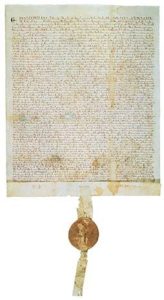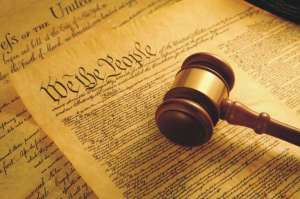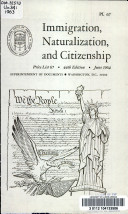“Monday Musings” for Monday June 15, 2015
Volume V, No. 24/232
Happy Birthday, Magna Carta !
By: Assad Meymandi, MD, PhD, DLFAPA, ScD (Hon)*
Today is the 800th anniversary of Magna Carta, Latin for “Great Charter.” Next time you are in London, go by the British Library, near Euston Station, climb the stairs. On the left you enter a pavilion full of old books, ancient manuscripts, including a Guttenberg Bible, etc. On the right, you will find a good size room set aside to display the magnificent British document, the Magna Carta, signed by King John of Lackland dated December 28, 1215. The document was actually written in Runnymede on June 15, 1215.
The room exhibiting Magna Carta is wired with the latest technology to give the viewers all they want to know about Magna Carta. But I have found the display, describing King Lackland’s Magna Carta, much lacking (pun intended), especially in the intellectual and political history of the precious document. What is presented in the British Library is very useful, but short on depth and epistemic understanding of events leading to the birth of the document. Here are some reflections and a brief critical analysis:
Faithful readers of this space recall the essay on Queen Matilda Maude of England (February 7, 1102- to September 10, 1167), who laid the cornerstone of Anglo-Saxon freedom and the governance of the rule of Law. Matilda was like our 20th century Susan B. Anthony (February 15, 1820 to March 13, 1906), who championed women suffrage by laying the work for the 19th amendment which was signed in 1919 by President Wilson. What a feat, 92 years of freedom and voting right for the American women. Going back to Matilda Maude and her important work to sow the seeds of Magna Carta in Britain’s mental space: Matilda and her younger brother were the only two legitimate children of King Henry I who had altogether sired 23 children. She reigned for a brief period of time and was never crowned, thus not listed in the British monarchic line of succession. Instead, her male cousin Stephens of Blois was the monarch 1135-1154 and is listed in the history books. Omitting the work and contribution of Matilda Maude form history of Magna Carta is a major historic and intellectual oversight.
Another significant omission is the impact of assassination of Thomas Beckett, the Archbishop of Canterbury, on December 29, 1170. As one notices, he was assassinated one day short of 45 years before the signing of Magna Carta. Archbishop Becket was assassinated by four knights from the court of King of England Henry II. They were dispatched to “rid England from a bothersome and intruding priest”. With the brutal killing of Beckett, the public became sensitized to the atrocities of Henry II, his wife Eleanor of Aquitaine, and their three sons (very much like Libya’s Gaddafi and his sons) and a ground swell of revolt against kingship began to slowly brew over the next 45 years. Indeed the excesses of Kings of England over a century brought on the emergence of Magna Carta, the principle message of which was to severely restrict the powers of the throne.
King John Lackland who signed Magna Carta was not a benevolent and humanitarian king like King Cyrus the Great of Persia and Hammurabi of Babylon and other famous altruists of yore. The 12 years old battle of Bouvines definitely restored French power under King Phillip II Augustus bringing the Angevin-Flanders conflict to an end. But the battle of Bouvines in 1214, enfeebled King John considerably. By 1214, King John was a worn out fellow bereft of energy and friends. The British Lords and aristocracy viewed him as a usurper of land with hedonistic tendencies similar to those Henry III. They detected King John’s weakness and vulnerability by moving rapidly and writing a document consisting of 61 clauses, they named it Magna Carta. It restricted the liberties of the king and moved England toward a constitutional monarchy. Magna Carta is essentially an unimpressive document mostly dealing with laws of commerce and cannons of trade. It does not hold a candle to US Constitution, our Bill of Rights, and the Declaration of Independence But some of its clauses are brilliant examples of human rights advocacy. Consider Article 39. It states “No freeman shall be arrested or imprisoned or deprived of his freehold or outlawed or banished or in any way ruined, nor will we take or order action against him, except by the lawful judgment of his equals and according to the law of the land.” Doesn’t it sound like something written by John Locke or Thomas Jefferson? In America, we are blessed to have the intellectual depth, wisdom, and knowledge of 2500 years history by a group of devoted patriots, America’s founding fathers who gave us our Republic. They skillfully wove concepts from Declaration of Human Rights by Persia’s King Cyrus the Great, dubbed Messiah in the Bible (Isaiah 41), Code of Hammurabi, and the renaissance philosophers, especially Pico Della Mirandola’s “Oration on the Dignity of Man” in the tapestry of our beloved nation.
Personally, I love America. Unlike many of my misguided colleagues who are ashamed of America, I am proud of America. I love the cacophony and gridlock in US Congress with 8% approval rating. I love the liberty and freedom to disagree, argue, and have robust and serious conversation without fear of being arrested and jailed. I love America’s devotion and commitment to supremacy of the rule of law and not those of a ruler, a Shah, an Ayatollah or a some two-bit dictator-President-for-Life. And I am happy to pay my taxes to ensure the survival of our freedom, but not happy to see my taxes wasted, and moneys misspent on programs that encourage delinquent and antisocial behavior. Behavior like irresponsibly fathering many children by many women, and not being a daddy to them. Behavior like setting one’s highest ambition in life to get on public welfare. Behavior like coming to America, living here for many years, enjoying the fruits of the liberty, freedom and equality America offers, yet not learning the English language, and not assuming any civic pride and patriotic responsibility….
*The writer is Adjunct Professor of Psychiatry, University of North Carolina School of Medicine at Chapel Hill, Distinguished Life fellow American Psychiatric Association; Life Member, American Medical Association; Life Member, Southern Medical Association; and Founding Editor and Editor-in-Chief, Wake County Physician Magazine (1995-2012).








